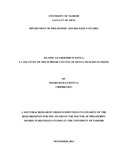Islamic leadership in Kenya: a case study of the supreme council of Kenya muslims (Supkem)
Abstract
This study is an assessment of Islamic leadership in Kenya. It evaluates SUPKEM‘S
contribution in addressing various needs of Muslims in Kenya. The problem is that Muslim
community in Kenya has been around for more than 1000 years. Their population since then
has expanded tremendously. Their needs have multiplied likewise. To address the needs
SUPKEM was formed in 1973 to provide united leadership for Muslims in Kenya, represent
them in negotiating with other organizations and governments. Despite establishing
SUPKEM as the umbrella body of Islamic leadership in Kenya, Muslims still have many
needs which are not addressed especially in regards to their leadership. For instance, it has
been generally observed that Muslims are disunited and divided and they continue doing so
every year especially during the beginning and the end of Ramadan. Hence instead of uniting
efforts in matters beneficial to their progress they waste a lot of time debating on ideologies
like moon sighting. There is also lack of cooperation and collaboration between SUPKEM
and other Muslim organizations creating a lot of disputes and conflicts between them.
The results indicated that Muslims in Kenya have various needs which pose numerous
challenges to its leadership in addressing them(internally and externally) which are structural,
ideological, economic and political in nature. These concerns and many others indicate that
there is dire need to make an in-depth assessment of Islamic leadership in Kenya with a focus
on SUPKEM. It is hoped that the results of this study will have significant contributions for
Islamic leadership and guarantee the welfare of Kenyan Muslims based on good leadership.
The study begins by examining Islamic leadership in Kenya focusing on SUPKEM and its
service to Kenyan Muslims. Its objectives were to; Outline the historical development of the
Muslim community in Kenya, Articulate the fundamentals of Islamic Concept of leadership,
Examine the establishment and development of SUPKEM as the leading organization for
Kenya Muslims, Identify the needs of Kenya Muslims, Evaluate SUPKEM leadership in
addressing needs of Kenya Muslims then make relevant conclusions and recommendation.
While quantitative data was collected for basic objective information the bulk of the data
depended on qualitative method through in-depth interviews, participant observations and
examination of records.
Nairobi was utilized as the base while Embu, Kakamega and Kilifi were analyzed to establish
grass root opinions about leadership within SUPKEM secretariat. It sampled categories of
SUPKEM leaders and staff as well as other organizations.
The research utilized trait theory when analyzing if SUPKEM leaders‘ traits influence the
leadership and the Situational Leadership Theory when assessing different styles of
leadership applied by SUPKEM especially when the top leadership delegate, coach, direct,
and support their affiliate members/affiliate organizations.
The findings revealed that Kenya Muslims have various needs which pose challenges to them
as well as SUPKEM. Power struggle among the Muslim organizations; extremism and
terrorist activities; insufficient informed political advice; lack of employment for Kenya
Muslims. Upcountry Muslims perception of a subtle racism in the Islamic leadership and
understaffing at SUPKEM are among challenges facing Kenya Muslims. The study generally
recommends that SUPKEM implement its constitution in serving Kenya Muslims which will
ensure SUPKEM‘s objectives are met through enhanced leadership. Areas of further research
include case study of other Islamic leadership bodies, role of mosque and madrassa
institution in Kenya, women in Islamic leadership in Kenya and terrorism in Kenya among
other areas.
Citation
Doctor of philosophy in religious studiesPublisher
University of Nairobi
Description
Doctor of philosophy in religious studies

